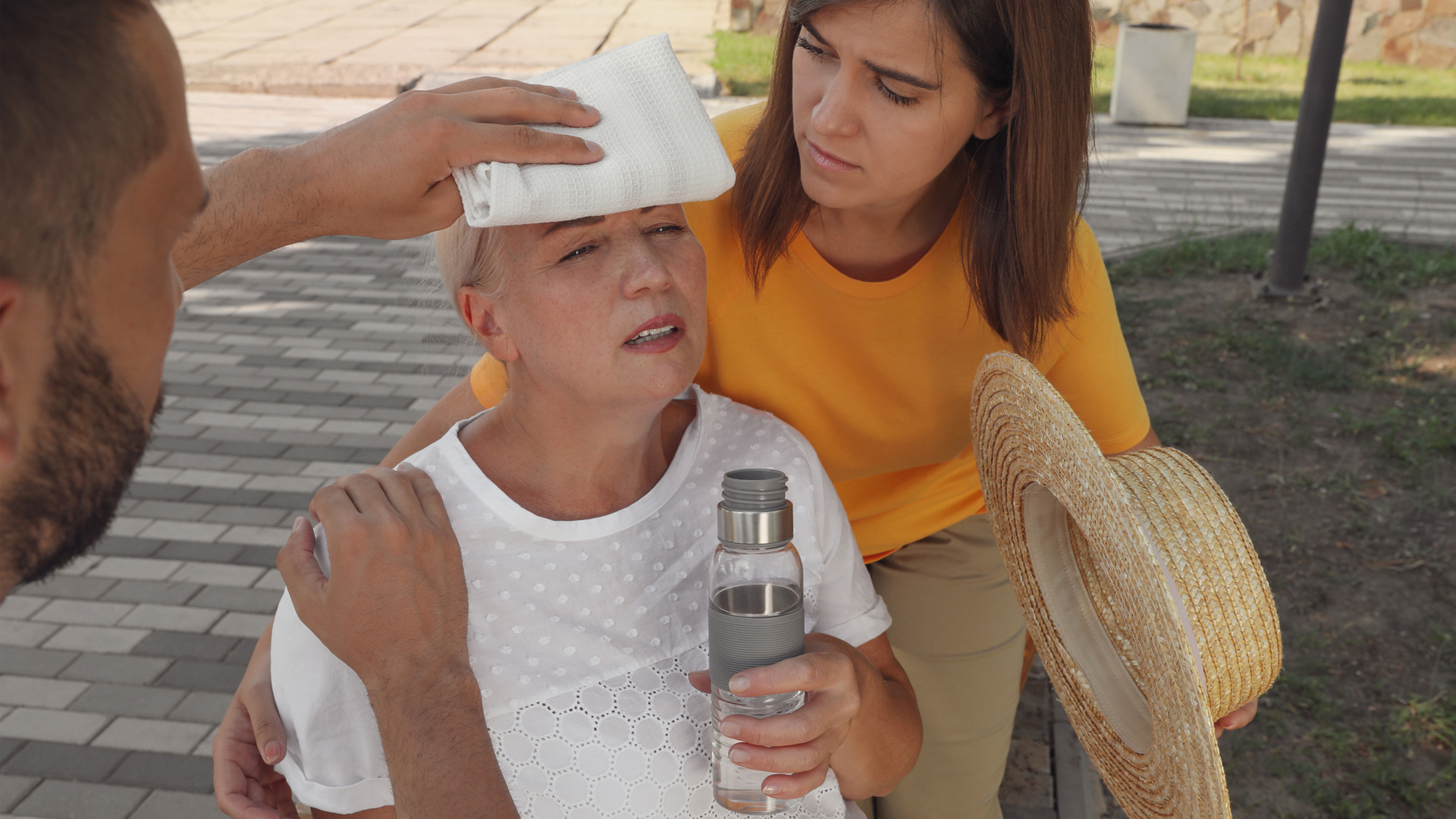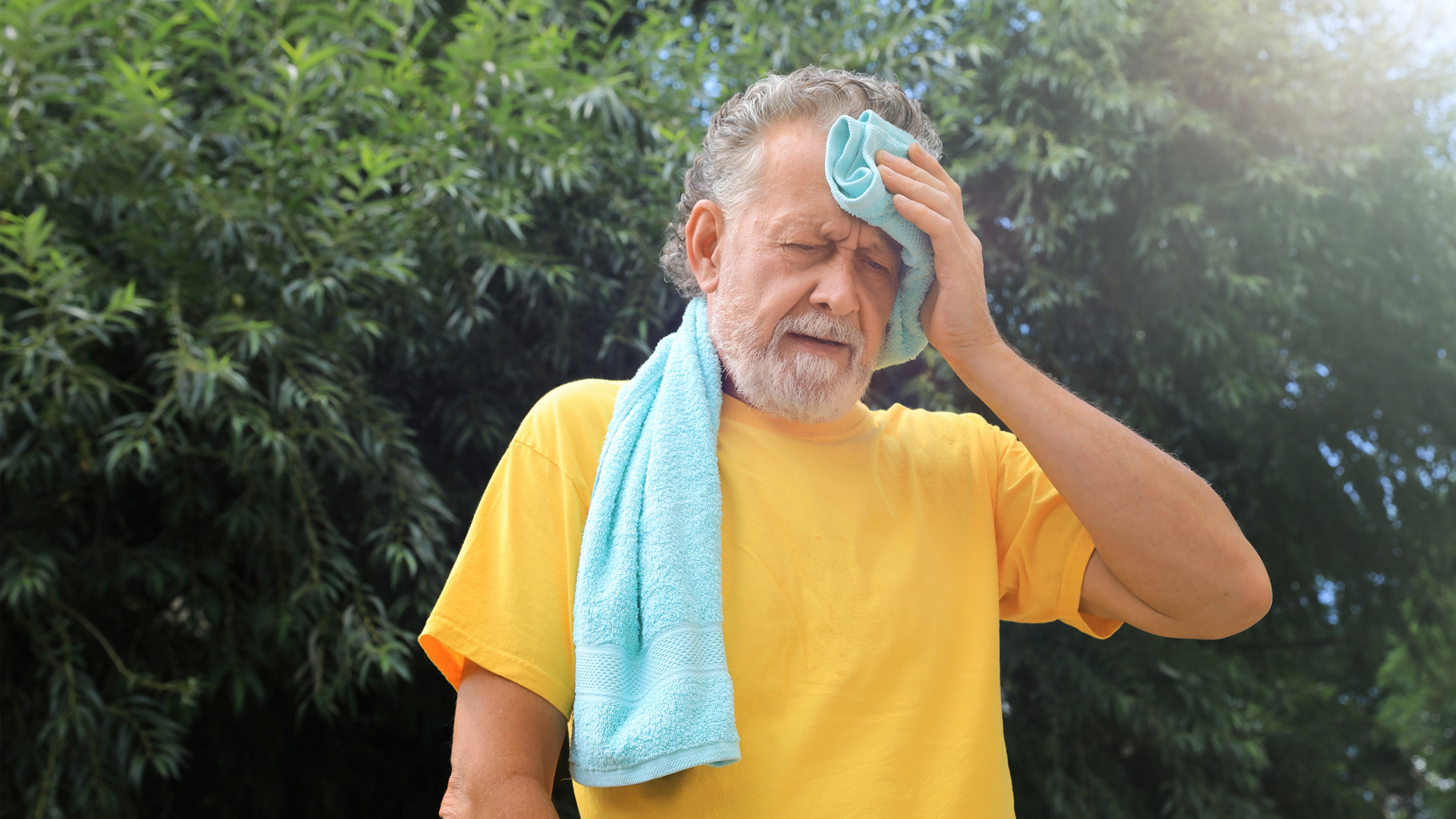Heat intolerance: What are the symptoms, causes and treatment?
Does heat affect you more than most? Here’s everything you need to know about heat intolerance

Get the world’s most fascinating discoveries delivered straight to your inbox.
You are now subscribed
Your newsletter sign-up was successful
Want to add more newsletters?
Join the club
Get full access to premium articles, exclusive features and a growing list of member rewards.
Heat intolerance is a condition where the body can’t regulate its internal temperature properly. This can lead to a higher risk of developing heat stroke, which can be life threatening. Some conditions are known to lower your tolerance to heat and make you more susceptible to overheating, so people with these need to be extra cautious in summer or in hot environments.
We’ve spoken to medical experts about heat intolerance to get their views on the causes, symptoms and possible treatments, as well as their best advice for those with underlying conditions that might put them at higher risk. If you’re worried about getting hot and bothered, we’ve also put together a list of ways to stay cool in the heat and how to stay hydrated.
What is heat intolerance?
“Heat intolerance (HI) is a disorder of thermoregulation,” explains Dr Deborah Lee, MD, from Dr Fox Online Pharmacy. It’s a serious condition, which increases the risk of heat stroke. The body cannot function when it gets too hot. Being overheated causes cells to die, blood becomes hypercoagulable and more likely to clot, and the gut starts to leak toxins into the bloodstream. Organs start to fail, and irreversible brain damage can occur.”

Having worked for many years in the NHS, initially as a GP, and then as Lead Clinician for an integrated Community Sexual Health Service, Dr Deborah Lee now works as a health and medical writer, with an emphasis on women’s health. She is a menopause specialist.
A review in Pediatrics in Review warns that there is a difference between fever and heat stroke, as the body is still in control of thermoregulation even when feverish, but with heat stroke it loses that control. The review also states that if a child’s core temperature rises above 105.8F (41C) for more than a short time, they are at risk of thermal injury.
Dr Tariq Mahmood, MD, medical director of Concepto Diagnostics, explains more: “People with heat intolerance experience an unusual level of sensitivity to heat. It isn’t a disease in itself, but there are a number of conditions that can cause someone to suffer from it and it can also be a symptom of an underlying medical condition.
“A person with heat intolerance can experience physical symptoms such as increased sweating, or psychological symptoms like feelings of anxiety. It’s important to listen to your body when in direct heat, as heat-related illnesses are prominent during the summer and can be fatal in acute cases.”

Dr. Tariq Mahmood has nearly 30 years of experience in ultrasound, paediatrics, general medicine/surgery, radiology, orthopaedics and obstetrics. He earned his bachelor's degree in Medical and Surgery from the Nishtar Medical College Multan in Pakistan in 1988 and spent seven years as a trainee radiologist after graduation before embarking on a career as a sonologist, sonographer, and ultrasound practitioner in the U.K.
Dehydration is another risk when someone is too hot, according to Johns Hopkins Medicine. If you are on diuretic medication you should be careful to avoid dehydration, as this can cause more frequent urination, ridding your body of salt and water. Extreme dehydration may need to be treated with intravenous (IV) fluids, so it’s important to seek medical help if you think you may be severely dehydrated.
Get the world’s most fascinating discoveries delivered straight to your inbox.
What causes heat intolerance?
Lee says that a few conditions can cause heat intolerance. “In some individuals, HI may be due to genetic alterations meaning the person has a lower exercise tolerance in moderate heat,” she says. “Other cases of HI may be linked to dysautonomia, which occurs in association with a range of diseases that affect the nervous system. These include:
- Alcoholism
- Autoimmune diseases
- Diabetes
- Ehlers Danlos Syndrome
- Guillain Barré Syndrome
- HIV
- Long Covid
- Multiple sclerosis
- Spinal cord injuries and traumatic brain injuries
- Dementia
- Parkinson’s disease
Lee says that heat intolerance is also more common in those with sympathetic nervous system dysfunction. Conditions include:
- Chronic fatigue syndrome/ME
- Fibromyalgia
- Irritable bowel syndrome

Mahmood says that diabetes in particular can lead to dangerous levels of heat intolerance. “People with diabetes are at a higher risk of suffering from heat exhaustion and can also be more prone to heat intolerance,” he says. “Diabetes complications can include damage to blood vessels and nerves, subsequently affecting sweat glands, making the body unable to cool as effectively as it usually would.
“Unfortunately, in instances like these, heat intolerance isn’t treatable or preventable, but people are able to protect themselves and take proactive steps to avoid finding themselves in particularly warm situations.”
What are the symptoms of heat intolerance?
Mahmood says that individual experience of heat intolerance can vary, but some symptoms are more common than others. “Heat intolerance symptoms vary on a person-by-person basis, but can include feeling uncomfortably warm when in moderate temperatures, fatigue, exhaustion, nausea, vomiting, mood swings or even not sweating enough in the heat,” he says. “People with chronic illnesses like multiple sclerosis can experience worsened symptoms when in high temperatures and people with endocrine system problems, such as a thyroid condition, can struggle in heat as the body isn’t able to regulate itself.”
According to Lee, the most common symptoms of heat intolerance include:
- Feeling hot and uncomfortable when the temperature is only slightly raised
- Feeling light-headed or dizzy
- Headaches
- Feeling weak and tired
- Muscle cramps
- Nausea and sometimes vomiting
- Rapid heartbeat
- Excessive sweating
- Inability to sweat

Can you treat heat intolerance?
Heat intolerance is not something that can be treated with medication, but there are measures you can take to reduce the risk of overheating:
- Take a cold shower or bath
- Use cold washrags or ice packs on your neck and wrists
- Run a fan or air conditioning when you sleep
- Close your curtains or blinds to create a shade
- Don’t go out in the sun for long periods of time
- Drink plenty of water, iced water will keep you cool as well as hydrated
- Sleep in breathable linens
“The first step in treating HI is to recognise you are at risk,” adds Lee. “If you have any of the above underlying conditions, HI may well be a problem for you, so you need to be aware. You need to plan ahead to adopt measures to prevent yourself from overheating. It’s also imperative that any underlying medical conditions are treated.”
This article is for informational purposes only and is not meant to offer medical advice.

Lou Mudge is a health writer based in Bath, United Kingdom for Future PLC. She holds an undergraduate degree in creative writing from Bath Spa University, and her work has appeared in Live Science, Tom's Guide, Fit & Well, Coach, T3, and Tech Radar, among others. She regularly writes about health and fitness-related topics such as air quality, gut health, diet and nutrition and the impacts these things have on our lives.
She has worked for the University of Bath on a chemistry research project and produced a short book in collaboration with the department of education at Bath Spa University.
 Live Science Plus
Live Science Plus










